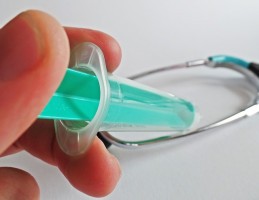
Blood cancer patients who receive a type of anti-cancer therapy should continue to take the drug while having COVID-19 vaccinations, a new study suggests.
The findings of a clinical trial led by the University of Birmingham and the Oxford Clinical Trials Research Unit based at the University of Oxford, published today in Lancet Haematology suggest that patients with a type of blood cancer called Chronic Lymphocytic Leukaemia (CLL) who are being treated with Bruton Tyrosine Kinase inhibitors (BTKi), should continue their therapy while receiving COVID-19 vaccination.
The IMPROVE study investigated whether a three-week pause in BTKi therapy around the time of COVID-19 vaccination would improve the antibody response in patients with CLL, compared to continuing treatment.
CLL is the commonest adult leukaemia and is associated with an increased risk of infection.
People with CLL often have lower antibody responses to vaccination than the general population.
This finding is most noticeable in those taking a BTKi drug such as ibrutinib or acalabrutinib.
Previous evidence from observational studies suggested that pausing the BTKi drug around the time of vaccination may improve the antibody response.
However, the IMPROVE trial results showed no difference in antibody levels between those who paused their medication and those who continued their treatment as usual.
Reassuring evidence
The trial recruited from 11 hospitals across the UK and involved 99 adults with well-controlled CLL who had been on BTKi therapy for over a year.
Participants were randomly assigned to either pause their BTKi drug for three weeks (one week before and two weeks after vaccination) or to continue their medication without interruption.
The study measured immune responses before vaccination, three weeks after, and twelve weeks post-vaccination.
The research team found that pausing BTKi therapy did not result in higher antibody levels compared to continuing their BTKi medication.
Also, the quality of the antibody response and cellular immunity was similar in both groups.
These findings remained consistent 12 weeks after vaccination.
Although the study found no evidence that a pause in BTKi therapy improves the immune response to COVID-19 vaccination for people with CLL, it has highlighted how variable responses are amongst patients who take this line of therapy.
Future research funded by UK Research and Innovation (UKRI) and Blood Cancer UK is now underway, using the blood samples collected during the trial.
This work aims to understand more about how people with CLL respond to COVID-19 vaccination and how this response might be improved further in the future.
Dr Helen Parry, Associate Professor at the University of Birmingham’s Department of Immunology and Immunotherapy, researcher within the Cancer Inflammation theme at the National Institute for Health and Care Research (NIHR) Birmingham Biomedical Research Centre and Chief Investigator of the IMPROVE trial, said:
“Our study provides clarity for blood cancer patients and their healthcare providers, that pausing BTKi therapy around the time of COVID-19 vaccination does not improve their antibody response and should not be recommended in clinical practice.”
Source: University of Birmingham
We are an independent charity and are not backed by a large company or society. We raise every penny ourselves to improve the standards of cancer care through education. You can help us continue our work to address inequalities in cancer care by making a donation.
Any donation, however small, contributes directly towards the costs of creating and sharing free oncology education.
Together we can get better outcomes for patients by tackling global inequalities in access to the results of cancer research.
Thank you for your support.